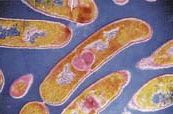 All this “Listeria Hysteria” that followed the reports of contaminated cantaloupe reminds me of a Twilight Zone episode.
All this “Listeria Hysteria” that followed the reports of contaminated cantaloupe reminds me of a Twilight Zone episode.
We’re destroying a relatively healthy food by the ton, issuing dire warnings about deadly pathogens, and generally scaring an already scared public, all without taking stock of what’s really going on. I don’t mean to downplay the tragedy of listeria-related deaths, or the troubling increase in food-borne pathogens. But blaming cantaloupe is an example of shooting the messenger, if ever I saw one.
The reality is, most people exposed to Listeria do not even get sick, let alone die from the exposure. This bacterium is considered an “opportunistic” pathogen by microbiologists. This means it is only dangerous to people with a compromised immune system complex.
In this sense, it’s similar to flu viruses. Many millions of people are exposed, yet only a relatively  small number actually get sick. Listeria, like the flu viruses, only cause serious illness when a host’s immune system cannot respond adequately.
small number actually get sick. Listeria, like the flu viruses, only cause serious illness when a host’s immune system cannot respond adequately.
Vulnerable populations include the very young, pregnant women, the elderly, HIV infected individuals, and people on immunosuppressive medications, as public health officials have clearly stated.
As of this posting, the current Listeria “crisis,” has caused 15 deaths and 84 episodes of severe illness, and it is being called the deadliest food-borne disease episode in more than a decade.
I’m not saying that I’m happy to hear about Listeria in the melons, and there are clearly quality and safety gaps in many aspects of our food supply systems. But to me, the Listeria issue underscores the bigger problem of widespread immune system complex compromise. Before we succumb to Cantalouphobia (irrational fear of tasty melons), let’s look at the situation.
The median age of those killed in the current outbreak is 78 years, according to the CDC. That underscores the fact that this is an issue for people who are immunocompromised. The people who got sick who do not fit the above profile (very young, elderly, pregnant, HIV-positive, on immunosuppressive drugs), probably have some other sort of immunosuppressive condition. Such conditions are far more common than we like to acknowledge.
To prevent infection from Listeria and other bacteria and viruses like the flu, keep your own immune system, and your patients’, in tip-top shape. Get off grains and sugar that promote yeast overgrowth. Yeast produce chemicals (mycotoxins) that weaken the immune system. Chronic Candida infection is a major drain on the immune system and it opens the “terrain” for infection with other bugs.
Instead of simple carbohydrates, people need to eat foods with a high phenolic/antifungal content.
You also need to make sure thyroid levels are adequate. Thyroid hormone is critical for optimal immune system complex function.
Take an iodine/iodide supplement. Iodine in the blood stream is like chlorine in the swimming pool; it inhibits the growth of microorganisms.
Make sure levels of vitamins A and D are adequate.
A weak, dysfunctional digestive tract is a major portal not only for Listeria and E. coli, but many other pathogens as well. Stomach acid is a first-line defense against food-borne bugs, and unfortunately, many people in this country have weakened digestive systems (read Good Digestion Requires Right pH at Right Place from HPC’s archive) . Hypochlorhidria (low acid production) is very common, aided and abetted by the use of acid-suppressive drugs like Priosec and the Purple Pill.
Hydrochloric acid is normally produced to sterilize our stomachs after we eat. It
was used as a potent antiseptic during the First World War. Stomach acid production declines with age, which is one reason elderly people are more susceptible to infections like Listeria.
Below is a list of symptoms and conditions reflective of or associated with low hydrochloric acid production. If any of your patients fit this profile, consider supplementing with HCl and digestive enzymes. There are many great products on the market. I’ve formulated one I call “Robynzyme” which is available at: D & S Pharmacy, West Texas Pharmacy, and Southpark Pharmacy in Amarillo, or my website: www.drfitt.com.
The point is, we can prevent deaths and illness due to Listeria and other food-borne pathogens by helping patients to strengthen their innate defense systems. So before we declare cantaloupe as Public Health Enemy No. 1, let’s bring a little sanity to the situation and help people bolster their immune systems!
Low HCl Production: Symptoms & Related Conditions
Asthma
Celiac disease
Chronic fatigue syndrome (CFS)
Diabetes mellitis
Eczema
Lupus
Macular degeneration
Multiple chemical sensitivity
Pernicious anaemia
Psoriasis
Acid Reflux
Rheumatoid arthritis
Rosacea
Stomach ulcers/Helicobacter pylori
Urticaria (hives)
Vitiligo
Stomachache, discomfort, belching or bloating after meals
Feel unwell/fatigued right after meals
Sensation of food or water ‘sitting in the stomach’ after eating or drinking
Nausea/stomach upset after ingesting high-fat foods
Undigested food in stool
Poor appetite or feeling overly full easily
Multiple food sensitivities
Trouble digesting red meat
Constipation
Low iron levels
Frequent nausea
Nausea/reflux after taking supplements (e.g. fish oil)







